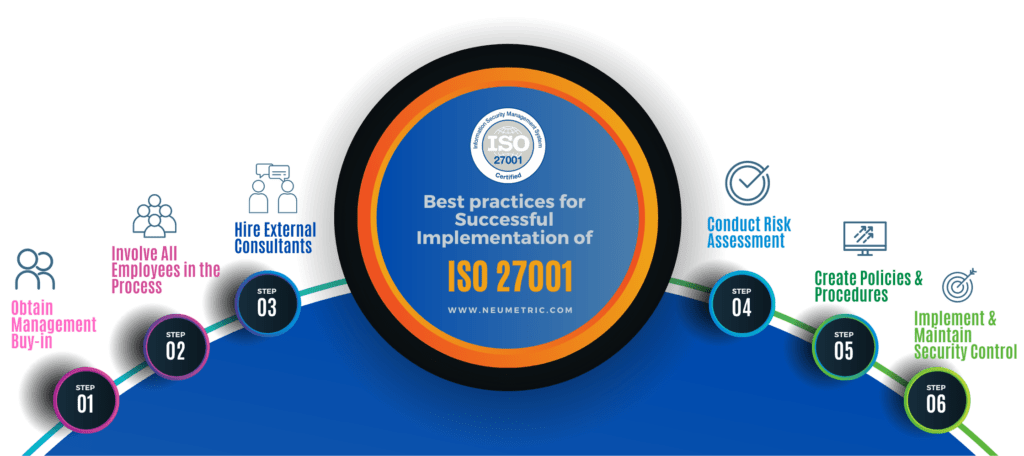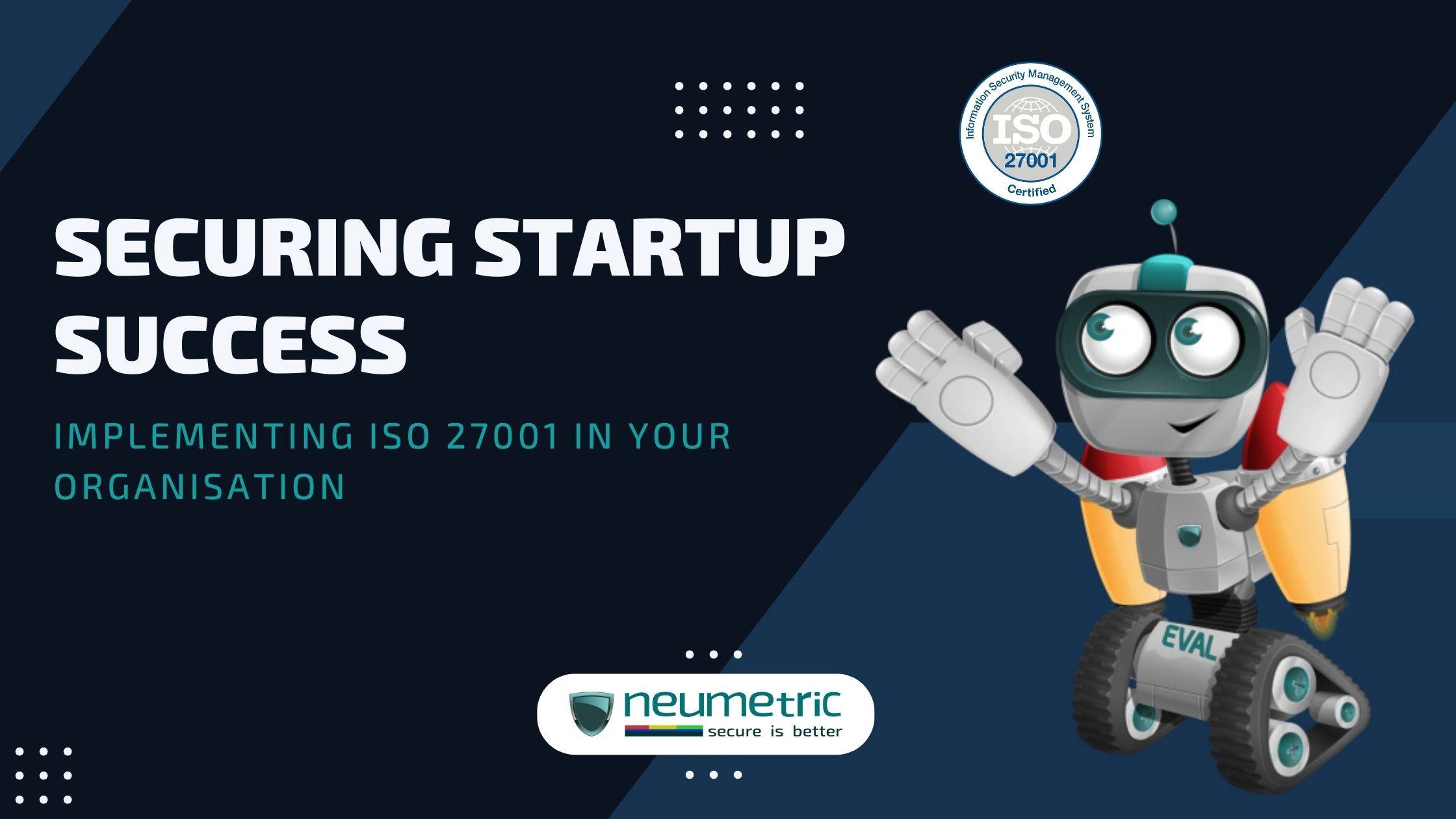Table of Contents
ToggleIntroduction
In the current digital age, cybersecurity has become a critical aspect of every Organisation, irrespective of its size & scale. Startups, being at the early stages of their development, face several challenges in their initial stages, one of which is cybersecurity. Cyber threats can have a severe impact on a Startup’s operations & can potentially lead to financial loss, reputational damage & even legal liabilities. Therefore, it is imperative for Startups to prioritise their cybersecurity posture to ensure their success.
The International Organization for Standardization [ISO] is a globally recognized body that develops & publishes standards for various aspects of an Organisation’s operations. ISO 27001 is a widely used Standard that outlines the requirements for an Information Security Management System [ISMS]. Implementing ISO 27001 can be an effective way for Startups to enhance their cybersecurity posture & ensure their success in the long run. This Journal will go deeper into ISO 27001, its benefits for Startups, key components of its implementation & the challenges that Startups might face in implementing it.
What is ISO 27001?
ISO 27001 is a globally recognized Standard that outlines the requirements for an Information Security Management System [ISMS]. The Standard provides a Framework for establishing, implementing, maintaining & continually improving an Organisation’s Information Security Management System. The primary objective of ISO 27001 is to help Organisations protect their sensitive & critical information from unauthorised access, disclosure & destruction. It also aims to provide a systematic approach to managing information security risks.
Startups can benefit significantly from implementing ISO 27001 in several ways. Some of the significant benefits include:
- Enhanced cybersecurity posture: ISO 27001 provides a systematic approach to managing information security risks, which can help Startups identify, assess & mitigate potential threats. This can help Startups enhance their cybersecurity posture & protect their critical information assets from cyber threats.
- Increased customer trust & confidence: Implementing ISO 27001 can help Startups demonstrate their commitment to protecting their customers’ sensitive information. This can help increase customer trust & confidence in the Startup’s services or products, leading to increased customer loyalty & retention.
- Competitive advantage: Startups that implement ISO 27001 can gain a competitive advantage over their competitors. The Standard can help Startups differentiate themselves in the market by demonstrating their commitment to information security & ensuring that their customers’ data is protected.
- Compliance with legal & regulatory requirements: ISO 27001 is a widely recognized Standard that is often used as a benchmark for Compliance with legal & regulatory requirements related to information security. Implementing ISO 27001 can help Startups comply with various legal & regulatory requirements related to information security.
Implementing ISO 27001
Neumetric, as a cybersecurity consulting firm, can provide valuable services to Startups looking to implement ISO 27001 as a Framework for securing their success. Neumetric can offer the following services:
- ISO 27001 Implementation Services: Neumetric can help Startups with the implementation of ISO 27001 by conducting a Risk Assessment, developing Policies & Procedures, implementing & maintaining security controls & continuously monitoring & improving the ISMS.
- Gap Analysis & Remediation: Neumetric can conduct a Gap Analysis to identify Gaps between the Startup’s current security posture & ISO 27001 requirements. Based on the Analysis, Neumetric can provide recommendations for remediation.
- Internal Audit Services: Neumetric can conduct Internal Audits to ensure that the Startup’s ISMS is effective & compliant with ISO 27001 requirements.
- Employee Training: Neumetric can provide information security training to all Employees to ensure that they understand the Organisation’s information security requirements & their roles in implementing the ISMS.
- Compliance Consulting: Neumetric can help Startups comply with legal & regulatory requirements related to information security, such as GDPR, HIPAA & PCI DSS.
By offering these services, Neumetric can help Startups overcome the challenges associated with implementing ISO 27001, such as resource constraints & lack of expertise & knowledge. Neumetric’s expertise in ISO 27001 implementation can help Organisations implement an effective & sustainable ISMS, enhancing their cybersecurity posture, increasing customer trust & confidence & gaining a competitive advantage in the market.
Key Components of Implementing ISO 27001
Implementing ISO 27001 involves several key components that Startups need to consider. These components include:
The first step in implementing ISO 27001 is to conduct a comprehensive Risk Assessment to identify the potential risks & threats that the Organisation may face. The Risk Assessment should take into consideration the Organisation’s assets, the potential threats, the likelihood of the threats occurring & the potential impact of the threats on the Organisation’s operations.
After conducting the Risk Assessment, Startups need to develop & implement Policies & Procedures that address the identified risks & threats. These Policies & Procedures should cover various aspects of information security, including access control, data protection, incident management & business continuity.
Once the Policies & Procedures are in place, Startups need to implement & maintain appropriate security controls to mitigate the identified risks & threats. The security controls should be designed to protect the Organisation’s critical information assets from unauthorised access, disclosure & destruction.
It is essential to monitor & review the ISMS regularly to ensure that it remains effective & up to date. This involves conducting periodic audits, testing & evaluating the security controls & assessing the effectiveness of the Policies & Procedures.
Benefits of Implementing ISO 27001
One of the primary benefits of implementing ISO 27001 is that it can enhance a Startup’s cybersecurity posture. By identifying & mitigating potential risks & threats, Startups can protect their critical information assets from cyber threats.
Implementing ISO 27001 can help Startups increase customer trust & confidence by demonstrating their commitment to protecting their customers’ sensitive information. This can lead to increased customer loyalty & retention.
Startups that implement ISO 27001 can gain a competitive advantage over their competitors by demonstrating their commitment to information security. This can help differentiate them in the market & attract more customers.
ISO 27001 is a widely recognized standard that is often used as a benchmark for Compliance with legal & regulatory requirements related to information security. Implementing ISO 27001 can help Startups comply with various legal & regulatory requirements related to information security.
Challenges of Implementing ISO 27001 for Startups
One of the significant challenges that Startups face in implementing ISO 27001 is resource constraints. Startups often have limited resources, including time, money & personnel, which can make it challenging to implement & maintain an effective ISMS.
Implementing ISO 27001 requires specialised expertise & knowledge in the field of information security. Startups may not have the necessary resources or expertise in-house to implement & maintain an effective ISMS.
Implementing ISO 27001 can involve significant changes to the Startup’s existing processes & procedures. This can lead to resistance from employees & stakeholders, making it challenging to implement the necessary changes effectively.
Best Practices for Successful Implementation of ISO 27001

To overcome the challenges associated with implementing ISO 27001, Startups can follow best practices that can ensure the successful implementation & maintenance of the ISMS. Here are some of the best practices for successful implementation:
- Obtaining Management Buy-in: The senior management team’s support & commitment to implementing ISO 27001 are critical for the project’s success. They need to understand the benefits of implementing ISO 27001 & support the implementation process by providing necessary resources & leadership.
- Involving All Employees in the Implementation Process: All employees need to be aware of the importance of information security & their roles in implementing the ISMS. Startups can conduct information security training for all employees to ensure that they understand the Policies & Procedures, the risks associated with information security & their responsibilities.
- Hiring External Consultants or Auditors: Startups can benefit from hiring external consultants or auditors with specialised expertise in implementing & maintaining ISMS such as Neumetric. These professionals can provide guidance & support throughout the implementation process & help ensure that the Startup’s ISMS remains effective & up to date.
- Continuously Monitoring & Improving the ISMS: Continuous monitoring & improvement of the ISMS are critical for ensuring its effectiveness & long-term success. Startups need to conduct regular Audits, assess the effectiveness of the Policies & Procedures & make necessary adjustments to ensure that the ISMS remains effective & up to date.
- Conducting a Risk Assessment: Before implementing ISO 27001, Startups need to conduct a Risk Assessment to identify potential risks & threats to their critical information assets. This assessment will help Startups develop appropriate Policies & Procedures to mitigate the identified risks & threats.
- Creating Policies & Procedures: Startups need to develop Policies & Procedures that address the identified risks & threats. These Policies & Procedures need to be documented & communicated to all employees to ensure that they understand the Startup’s information security requirements.
- Implementing & Maintaining Security Controls: Startups need to implement appropriate security controls to protect their critical information assets. These security controls can include physical security measures, access controls, encryption & backup & recovery procedures.
By following these best practices, Startups can ensure that their implementation of ISO 27001 is effective & sustainable. These practices can also help Startups overcome the challenges associated with implementing ISO 27001, such as resource constraints, lack of expertise & knowledge & resistance to change.
Conclusion
In conclusion, cybersecurity is a critical aspect of a Startup’s success in the digital age. Implementing ISO 27001 can be an effective way for Startups to enhance their cybersecurity posture, gain a competitive advantage & comply with legal & regulatory requirements related to information security. While there may be challenges associated with implementing cost effective ISO 27001, such as resource constraints, lack of expertise & knowledge & resistance to change, following best practices such as obtaining management buy-in, involving all employees, hiring external consultants or auditors & continuously monitoring & improving the ISMS can help overcome these challenges & ensure successful implementation.
By implementing ISO 27001, Startups can not only protect their critical information assets from cyber threats but also gain the trust & confidence of their customers & achieve a competitive advantage in the market. Ultimately, implementing ISO 27001 can be a crucial step towards securing Startup success in the digital age.
FAQs:
How would you implement ISO 27001 in an Organisation?
ISO 27001 implementation involves conducting a Risk Assessment, developing Policies & Procedures, implementing security controls & continuously monitoring & improving the ISMS.
Can a Startup have an ISO 27001 certification?
Yes, a Startup can have an ISO 27001 certification, provided it meets the requirements of the standard.
What is the first step an Organisation takes in using ISO 27001?
The first step in using ISO 27001 is to obtain management buy-in & support for the implementation process.
How ISO 27001 can help an Organisation to improve information security?
ISO 27001 can help an Organisation improve information security by providing a structured framework for identifying & managing information security risks, ensuring legal & regulatory compliance, enhancing customer trust & gaining a competitive advantage.





